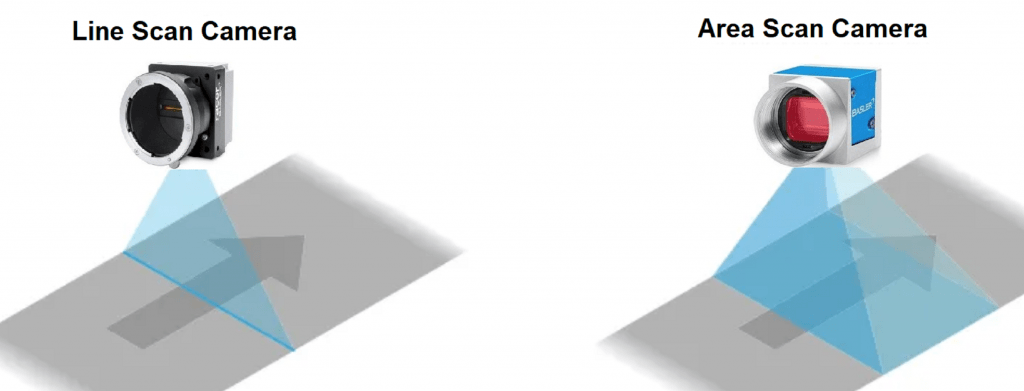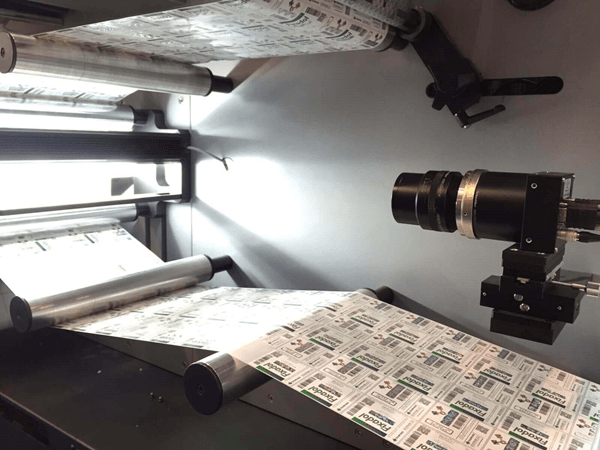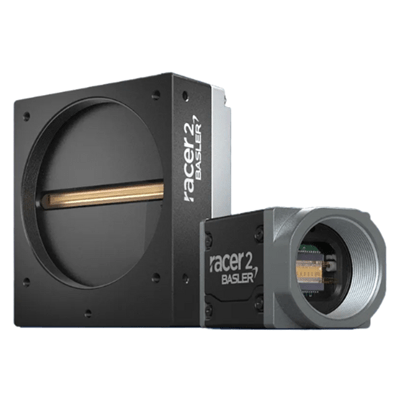
What is a line scan camera and how does it work?
A line scan camera is a specialised industrial camera that captures images one line at a time, unlike traditional cameras that take full-frame images in a single exposure. These cameras use a single row of pixels to scan objects continuously as they move past the camera. Because of this, the object or scene must be in motion for a complete image to be formed. The final image is created by stitching together multiple line scans, producing a seamless, high-resolution result.
Key Features of Line Scan Cameras
Line scan cameras come with various specifications to suit different applications. The most important features include:
- Sensor resolution – Typically from 512 to 16,000 pixels per line. Higher resolution captures finer details.
- Pixel size – Ranges from 3µm to 14µm. Smaller pixels provide higher spatial resolution, while larger pixels enhance light sensitivity.
- Line rate (scan speed) – 10-200kHz, indicating how many lines per second the camera captures.
- Sensor type –
- CMOS: Faster operation, lower power consumption.
- CCD: Better for low-light conditions but slower.
- Shutter type –
- Global shutter: Captures the entire line simultaneously, avoiding motion artifacts..
- Triggering – External triggers ensure precise image capture. Some cameras support encoder feedback, synchronizing scan speed with conveyor movement.
Line Scan vs. Area Scan Cameras
When choosing an industrial camera, it's essential to understand the key differences between line scan and area scan technology:
Learning hub
| Feature | Line Scan Camera | Area Scan Camera |
| Image Capture | Captures one line at a time, requiring object to be moving |
Captures entire frame in a single exposure |
| Best for | High-speed conveyor, continuous material, moving applications |
Stationary or slow moving objects |
| Resolution | Extremely high resolution with seamless image stitching | Dependent on sensor size |
| Lighting Control | Uniform lighting, reduces glare and shadows |
More sensitive to uneven light |
| Frame limitations | No restriction on image light |
Fixed frame size |
| Motion Blur | Minimal blue with encoder synchronisation | More prone to motion blur at high speeds |
| Common uses | Web inspection, print inspection, high speed sorting | Object recognition, barcode reading, 3D imaging |
Which one is right for you?
If you need continuous scanning of moving material, a line scan camera is the best choice, for capturing static images, an area scan camera is more suitable.
Where are Line Scan Cameras Used?
Line scan cameras are widely used in high-speed industrial and scientific applications, including:
- Quality inspection – Detecting defects in textiles, electronics, and automotive panels.
- Sorting systems – Used in pharmaceuticals, postal sorting, and food processing.
- Printing inspection – Identifying misalignment, smudging, and printing defects.
- Web inspection – Monitoring continuous materials such as metal, paper, or plastic film.
- Medical imaging – Applied in OCT scanning, dermatology, and dental imaging.

Why use a line scan camera?
 High-speed imaging - Ideal for fast moving conveyors and production lines.
High-speed imaging - Ideal for fast moving conveyors and production lines.
 Exceptional resolution - Detects tiny defects in manufacturing and quality control.
Exceptional resolution - Detects tiny defects in manufacturing and quality control.
 No frame size restrictions - Perfect for continuous material inspection (web inspection).
No frame size restrictions - Perfect for continuous material inspection (web inspection).
 Consistent lighting - Reduces shadows, glare and uneven illumination by capturing only one line at a time.
Consistent lighting - Reduces shadows, glare and uneven illumination by capturing only one line at a time.
 Superior dynamic range - Useful in medical imaging, print inspection, and material analysis.
Superior dynamic range - Useful in medical imaging, print inspection, and material analysis.
 Synchronisation - Works seamlessly with encoder feedback, eliminating motion blur in fast-moving objects.
Synchronisation - Works seamlessly with encoder feedback, eliminating motion blur in fast-moving objects.
 Compact and cost-effective - A single line scan camera can replace multiple area scan cameras reducing costs and system complexity.
Compact and cost-effective - A single line scan camera can replace multiple area scan cameras reducing costs and system complexity.
Choosing a trusted line scan camera
At OEM Automatic, we are an exclusive partner of Basler, a global leader in industrial vision technology. Basler’s line scan cameras are known for:
- High-resolution CMOS sensors (ranging from 2k to 16k resolution).
- Ultra-fast scan speeds (up to 100kHz or more for rapid inspection).
- Multiple interface options, including GigE, Camera Link, and CoaXPress, ensuring seamless integration into automation systems.
- Easy setup and configuration using the Basler pylon camera software suite.
Need Help with a Line Scan Camera Application?
Our Machine and Computer Vision team is here to help! Whether you need expert advice, product recommendations, or a proof-of-concept demonstration:
Phone support – Call us at 0116 284 9900
Email support – Contact us at [email protected]
Live chat – Available on our website
On-site visits – Our expert sales engineers can provide in-person demos and application support. Email [email protected] to arrange a visit or call us.
Let us help you find the right line scan camera for your application. Contact us today!

Recommended products

BASLER RACER 2L LINE SCAN CAMERAS
CoaXpress Line Cameras
- 8 k & 16 k resolution and up to 200 kHz line rate
- Supported by Pylon software suite for easy image acquisition
- Monochrome Cameras
- CoaXpress (CXP-12) interface
- Lens Mount: M72

BASLER RACER 2S LINE SCAN CAMERAS
Small Form Factor Line Cameras
- 2 k & 4 k resolution and up to 172 kHz Line Rate
- Supported by Pylon software suite for easy image acquisition
- Colour & Monochrome cameras
- GigE, 5GigE and CXP-12 interfaces
- 29 x 29 mm form factor

Basler Racer Line Scan Cameras
GigE & Cameralink Line Cameras
- 2 k to 12 k resolution and Up to 80 kHz Line Rate
- Supported by Pylon Suite software and open-source SDKs for easy image acquisition and fast application development
- Monochrome Cameras
- GigE Vison and Camera Link Interface Compatible
- Lens Mount: C-mount & F-mount
Basler Pylon Software
- Free Downloadable Software
- Lighting & Camera Software
- Plug & Play Interface



